Iwas lucky enough to travel overseas this year. Along the way, I kept a kind of diary, which I published to Facebook in the form of travel posts: miniatures of thought and feeling, composed at high speed and published in real-time.
A selection of those entries is posted below.
The journey meant a lot to me. Away at last, on the move, immersed in new horizons, I re-awoke in countless ways and felt myself connected to some new and vital energy.
Prior to the trip, I was struggling to write. I lacked confidence and trust. The well within was cracked and dry, when I sought out words to express my thirst.
All that changed on the road. In Portugal and Spain, especially, I was blasted from my torpor by a summer like no other.
Its effect was profound. The southern heat was so intense, so constant and pervasive, that I ceased to fret or ruminate in any self-defeating way; it simply wasn’t possible.
In place of thought, my body spoke: I sweat therefore I am.
I learned to love that feeling. Words came rushing back to me, in waves of vivid force. I wrote them down and sent them off, as quickly as I could.
The stories which those words express are secondary to me. I love the spirit and the energy, which I feel those words convey: their sense of joy and optimism; the portrait of a journey from one world to another.
Paul Bateman
31 December 2023
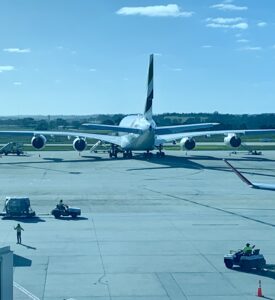
16 July, Melbourne, Australia
DEPARTURE LOUNGE
—————————-
Nothing but surrender
No more to be done
Ready for the final call
Above the clouds, the sun
19 July, Lancashire, England
Thanks for your birthday wishes, Friends! I’m with Shirley Bateman and her family on their farm in Lancashire, England.
I woke in the morning to the sound of soft rain, tapping on the roof. In the afternoon, the sky cleared, the sun shone, and we went to lunch at a local pub.
Later, we walked along a dirt track by a narrow canal, under stone bridges and over open fields.
A very good day.
30 July, Manchester, England
Travelled last week from Lancashire to Yorkshire, visiting towns and moving through landscapes that I first encountered as a teenager. Felt joy and melancholy in equal measure.
England is still England, but I’m no longer a boy with a backpack, wandering the world on a whim.
It’s true what they say: you can’t go home again.
Today, I fly to Lisbon. I’ve never been to Portugal. The future is unwritten, and I can barely wait…
31 July, Lisbon, Portugal
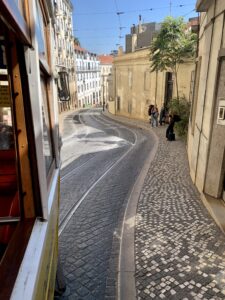 On this our first full day in Lisbon, we caught trams from one side of the city to the other – old wooden trams that screech and sway on gleaming, narrow tracks through steep and winding streets.
On this our first full day in Lisbon, we caught trams from one side of the city to the other – old wooden trams that screech and sway on gleaming, narrow tracks through steep and winding streets.
The streets are flanked on each side by pastel-coloured buildings, featuring ornate balconies and tall, distinctive windows.
Sometimes we saw people out on balconies, or glimpsed a billowing curtain that had caught the breeze.
In the afternoon, I drank my first great glass of Portuguese wine. Tonight, it’s a birthday dinner for the lovely Shirley Bateman at a local seafood restaurant.
I love Lisbon.
1 August, Lisbon, Portugal
The only map I’m carrying through this hot and gorgeous corner of the world is a map of Portuguese wine regions: from the Douro to Alentejo, there’s so much to learn and so much to like.
Today’s highlights? A visit to Adega Belém, an urban winery built and operating within a former car repair shop in Lisbon’s Belém neighbourhood.
Owners and winemakers Catarina and David were the most generous and brilliant hosts. At one point, David had me on a ladder pressing white wine grapes in an open vat, as the grapes fermented and fizzed on their skins.
We sat in the shade of the tasting room and sampled six different wines – the best of them (for mine) a local Blanc de Blancs.
In the afternoon, we nosed about in wine shops and settled on a 2022 Soalheiro Alvarinho from the Vinho Verde region (think lemon zest and stone fruit flavours, honey and a saline note).
Wine is a window to so many worlds: people, culture, history, language, climate, taste and time. But mostly people. That’s what made today so good.
7 August, Carvoeiro, Portugal
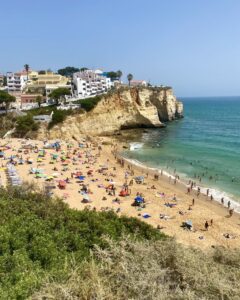 We drove today to Carvoeiro, a small town on a steep hill that overlooks the Bay of Lagos, Portugal.
We drove today to Carvoeiro, a small town on a steep hill that overlooks the Bay of Lagos, Portugal.
The town is defined by a series of narrow streets that converge in a small square at the base of the hill.
Three sides of the square are flanked by white-washed buildings, featuring window frames, shutters and doors that are painted with a single, vibrant colour – yellow or blue, most often.
The fourth side of the square opens to the sea. The effect is mesmerising.
You come to realise that over generations, the citizens of Carvoeiro must have chosen this aesthetic. Together, they have preserved, promoted and protected the design of their town.
They are, collectively, the architects of their own happiness.
Before we departed Carvoeiro, Shirley and I visited a small market filled with the most beautiful assortment of coloured crockery: bowls and plates etched in deep and radiant colour, featuring typical Portuguese patterns.
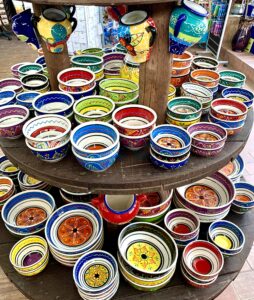 I wanted to buy every single object – to bring them home and fill my house with emblems of the region. Except, of course, I can’t.
I wanted to buy every single object – to bring them home and fill my house with emblems of the region. Except, of course, I can’t.
“Take a photo,” said a young woman who worked at the market.
And so I did. Several.
When I was done, the woman looked at me and smiled, as if to convey that she was happy that I was happy, too.
These are the colours of Carvoeiro.
8 August, Lagos, Portugal
Oh, I’m sailin’ away my own true love
I’m sailin’ away in the morning
Is there something I can send you from across the sea
From the place that I’ll be landing?
We leave for Spain tomorrow, but not before one final toast to the land that brought me back to life: I arrived here pale and tired; I leave happy, rested and renewed.
Portugal is a fascinating place. Its history has been shaped by Iberian tribes, Celtic peoples, the Roman Empire, Germanic kingdoms, Muslim invasions and the consequent Crusades (known locally as the Reconquista), by global exploration, and by challenges of the present day.
I found hints of all this in the language, landscape, architecture, culture and customs of Europe’s oldest nation-state.
But the thing I loved the most? Portuguese people: earthy, authentic and generous.
Obrigado Portugal! E adeus.
So take heed, take heed of the western wind
Take heed of the stormy weather
And yes, there’s something you can send back to me
Spanish boots of Spanish leather*
11 August, Seville, Spain
The heat in Seville is intense; the temperature reached 42C, yesterday.
Nonetheless, we head out every morning and cross the city by foot, moving in a blinding glare from one extraordinary sight to another – cathedrals, palaces, public squares, alleyways and gardens.
By day’s end, our skin and clothes are soaked with sweat. Our muscles ache. We manage though: sunglasses, hats, loads of water, a measured pace. In a way, I’ve come to love it.
After the arrival of the COVID-19 pandemic, I began to work full-time from home: the work was intense; the context challenging. Some days, I never left the house.
Over time, I stopped exercising, ceased writing and declined invitations. Like a plant left to whither in the absence of the sun, I shrunk somehow.
I understand this now – a long way from home, in the open air, in summer heat, on dusty streets, in tiny bars, drenched in sweat and breathing hard, with nothing in the diary but here and now and what comes next.
I feel so grateful and alive, resolved to hold this feeling.
13 August, Granada, Spain
I went in search yesterday of Federico Garcia Lorca, visiting sites throughout Granada where the esteemed Spanish poet, playwright and theatre director lived, worked and died.
Shirley and I visited the law school, where Lorca studied. We stood at the entrance to the arts college, where Lorca’s many creative talents were first recognised and encouraged. We ate at a restaurant, where Lorca often dined (bizarrely, a statue of Lorca still occupies a table at the restaurant). And we saw the house in which Lorca hid, before his arrest in 1936 by Nationalist Militia.
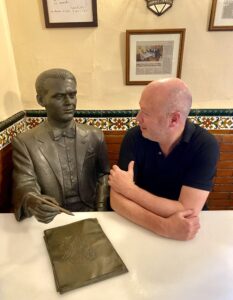
It was the realisation of a long-held dream to visit the city and sights that inspired a literary hero of mine. Even as I type these words, I can’t believe my luck.
I first read Lorca many years ago, at a time when my every serious engagement with the world was defined by a red-hot fervour and great earnestness.
To quote Bob Dylan: “I was so much older then, I’m younger than that now.”
Lorca spoke to my intensity – to that part of me that perceived itself to be caught in chaos and stumbling along a lonely road.
In many respects, Lorca is to literature what Australia’s Nick Cave is to music.
Like Cave, Lorca’s language and imagery often evokes heat, earth, shadows, dust, black crows, menacing clouds, hard-fought salvation and aching tenderness.
Even when I can’t understand what Lorca is saying, I love the way he says it: he pierces my skin, my armour.
Here’s an article I wrote about Lorca, a few years ago.
17 August 2023, Malaga, Spain
We were in Malaga this past week during Feria de Málaga, an annual week-long festival of parties, parades and concerts.
The streets were crammed with people of every age and background, many of them resplendent in the bright, traditional costumes of Andalusia.
We struggled at first: the noise, the crowds, the chaos.
The heat was unrelenting: a radiant heat that hung in the air, thick and suffocating. Every inch of my skin was wet with sweat. My feet were sore and blistered.
The locals sang and danced all day, fantastically indifferent to anything but the palpable spirit of which they were a part: a unifying, collective force that carried people from street to street in waves of sound and colour.
We surrendered to the mayhem. In crowded bars and alleyways, we stood shoulder-to-shoulder with strangers, drinking wine from tumblers and wrestling with the language when approached by someone local.
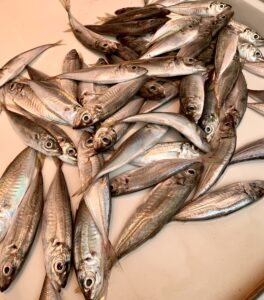 At the city market, we ate seafood plucked from a tray of ice; the fish was cooked on an open grill, then served to us on small white plates.
At the city market, we ate seafood plucked from a tray of ice; the fish was cooked on an open grill, then served to us on small white plates.
We escaped the heat one morning in the cool and spacious depths of the Picasso Museum (Pablo Picasso was born in Malaga in 1881): four floors of paintings and sculpture, as potent and impactful as any art I have ever seen.
And then, before the day was done, a final glass of chilled white wine in a Tapas bar or restaurant.
On the night before we flew to Majorca, as I lay in bed struggling to sleep, I heard deep, outrageous laughter from somewhere in the street below.
A man and a woman were stumbling home, provoking one another to riotous bursts of joyous noise. The street was filled with the sounds they made – and even when they disappeared, the empty street still trembled with the echo of their passing.
When this trip is over and I come back home, I want to live a better life – more fully present and alive.
20 August, Mallorca, Spain
What are the odds? An Australian in Spain, married to an English woman, when Australia hosts the 2023 FIFA Women’s World Cup Final between England and Spain!
I have received so many notes from family and friends (and read Australian media, too) suggesting that, in recent weeks, the Matildas – Australia’s national team – have, by their example, unified and inspired Australia.
I’d go further. The Matildas have animated communities way beyond Australia.
In Portugal and Spain, when strangers in a bar or cafe learn that I’m Australian, the Matildas are the first and most exuberant association those strangers make with the place that I call home – not the usual stereotypes of sharks, spiders, crocodiles and snakes.
The Matildas. They changed the game for good.
26 August, Mallorca, Spain
Soon after we arrived in Mallorca, Shirley and I took a slow train to Soller.
Since 1912 a narrow-gauge train has trundled along the winding 27km route, north from Palma (Mallorca’s capital) to the town of Soller.
The train passes through ever-changing countryside, before crossing an almost 500m-high mountain range via 13 tunnels (some more than 2km long) and a series of bridges and viaducts.
From Soller station, we took a very cute connecting tram to the Port of Soller for lunch and a swim.
Disneyland for adults.
28 August, Mallorca, Spain
We visited a Mallorcan winery last week for a pre-arranged tour and tastings.
4Kilos Wines was established in 2006 and comprises 45 acres of vines, across a variety of soils, on the outskirts of Felanitx.
We were led through the vines, the winery and the wines by the most brilliant guide: a young man named Toni, who at 23 years of age already possesses a fabulous and generous understanding of the industry in which he hopes to spend his life.
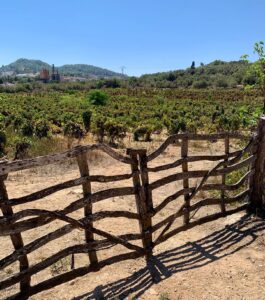 4Kilos – named after the price the current owners paid for the winery, almost 20 years ago ($40K AUD) – has spearheaded the trend in this part of the island towards lighter, more aromatic, terroir-driven wines.
4Kilos – named after the price the current owners paid for the winery, almost 20 years ago ($40K AUD) – has spearheaded the trend in this part of the island towards lighter, more aromatic, terroir-driven wines.
The vineyard includes limited plantings of Shiraz and Cabernet Sauvignon (for use in blended wines), but the focus is firmly on indigenous varieties. My favourite of these? Callet.
In the vineyard, Callet is a thick-skinned, late-ripening, high-yielding red grape varietal that retains acidity while achieving phenolic ripeness. Despite its deep colour, Callet contributes to wines with soft tannins and relatively low alcohol (11 per cent, for example).
Often, Callet is used to make light-bodied red wines that are blended with more robust varieties. But it works, too, as a fresh and fragrant stand-alone variety, with juicy red fruit flavours, a touch of anise and a hint of white pepper.
The wines of Mallorca are among the most fascinating and exciting wines that I’ve been lucky enough to try on this trip through Portugal and Spain; they deserve a wider audience.
We said farewell to Toni and drove from the vineyard down an unsealed road: a selection of wines in the boot; our heads still buzzing with the things we learned.
29 August, Mallorca, Spain
Traveller, there is no path. The path is made by walking.
– Antonio Machado (Spanish poet, 1875-1939)
Farewell, Mallorca! Farewell, Spain!
You welcomed us so warmly and showed us, by example, another way to live.
We forged a happy path.
3 September, Burscough, England
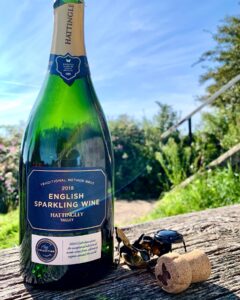 I got lucky. I married into the extended Prescott family, when I married Shirley Prescott in 2010.
I got lucky. I married into the extended Prescott family, when I married Shirley Prescott in 2010.
The Prescotts of Burscough, England, are among the finest, most decent, generous and down-to-earth people you could ever hope to meet.
Last night, in a village hall, about 80 people gathered to celebrate the life of Shirley’s father, Jim, who passed away in 2020 at the age of 86.
At the time of Jim’s death, much of the world was in lockdown on account of the COVID-19 pandemic; there were, by law, fewer than a dozen people at his funeral. Shirley was compelled to view the ceremony from her laptop, half-a-world away. It was a hard time.
The mood last night was positively buoyant, divested of the grief and exhaustion which defined the days that followed Jim’s death, three years ago: there were tables filled with plates of food; there was music, a bar and a series of speeches.
This afternoon, the family walked the dirt track that leads from their farm to a patchwork of fields by a narrow canal. There, in brilliant sunshine, they scattered Jim’s ashes over Lancashire soil.
Then we opened a bottle of sparkling wine and stood together, talking.
8 September, London, England
The city of London extends like a web from either side of the mighty Thames River, spilling and sprawling in every direction over hundreds of suburbs, parks and squares.
Look at a map of the London Tube: chaos and order, side-by-side. I love it.
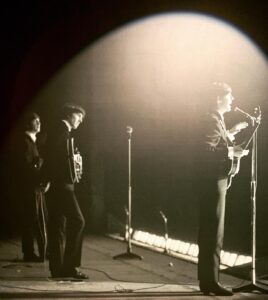 We have three days in the UK capital: three hot and humid, crowded days of plans and commitments.
We have three days in the UK capital: three hot and humid, crowded days of plans and commitments.
We park ourselves north of the Thames, in a flat the size of a shoebox, and ride the tube from Belsize Park to most of our engagements.
We walk through Covent Garden and Green Park.
We visit the National Portrait Gallery and enjoy, especially, an exhibition of Paul McCartney photographs featuring life on the road with The Beatles in the 1960s. From the fourth-floor gallery restaurant, we take in the most fantastic view of London: The Houses of Parliament, Nelson’s Column, The Eye, The Shard, Big Ben; an indelible, panoramic memory, lodged in the mind at a single glance.
We visit London’s oldest wine bar (Gordon’s) and the city’s oldest wine shop (Berry Bros & Rudd).
We witness the Changing of the Guard from outside Buckingham Palace.
I swim in a deep, vast pond within the wild expanse of Hampstead Heath (a truly surreal London moment).
And one night, at midnight, crossing Waterloo Bridge by foot, we see the floodlit dome of St Paul’s Cathedral suspended like a low moon in an otherwise dark and vacant sky.
But mostly, we visit the capital to catch up with old friends – and it is they who make our three-day trip to London such a memorable, magnificent excursion.
10 September, Manchester to Singapore
Turning for home, south by southeast, via three nights in Singapore.
14 September, Singapore
The final flight, the final leg, of this extraordinary journey – and yet I cannot bring myself to say that the journey is over.
This voyage has impacted me at some fundamental level; I am not the same person who left Melbourne in mid-July.
The journey awoke a part of me that once considered all life and living in the context of a larger journey: as a creative and expansive experience to be shared and celebrated; the journey as an invitation to a richer and more lucid life.
All the burdens and obligations that I left behind, nine weeks ago, are waiting for me in Melbourne – but their weight and scale have shrunk to fit this renewed and certain knowledge.
So that in the end, there is no end. The journey continues…
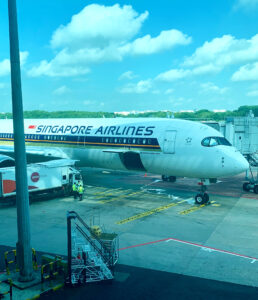
* Boots of Spanish leather (Music and lyrics by Bob Dylan)


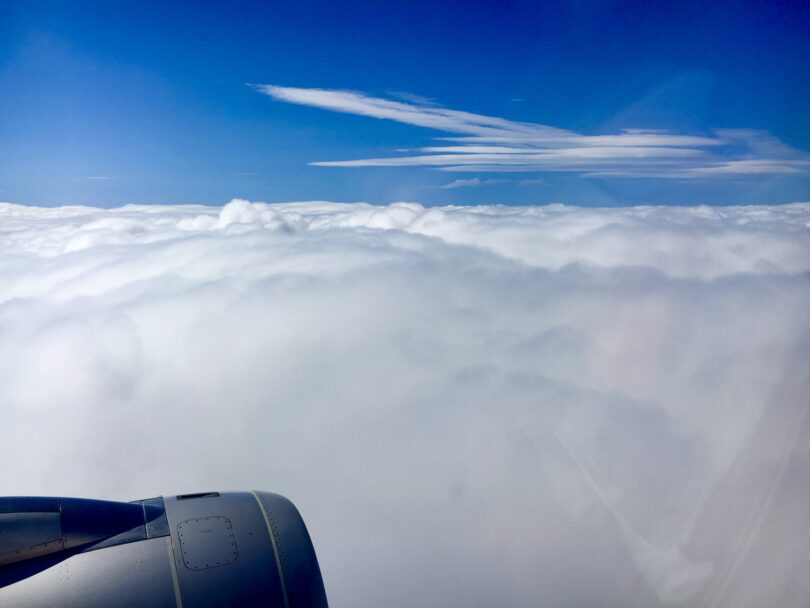
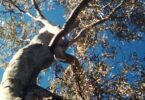


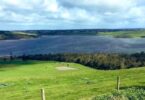

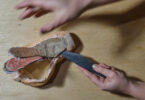
So pleased to be able to read an extended piece by you, Paul. To write something – anything (even a shopping list) – is better than to not write at all.
Looking forward to hearing (or reading) more about the swim at Hampstead Heath.
Good man! Thank you, Vin. You would LOVE the Hampstead pond: cold, clean, wild. Cheers mate. Paul